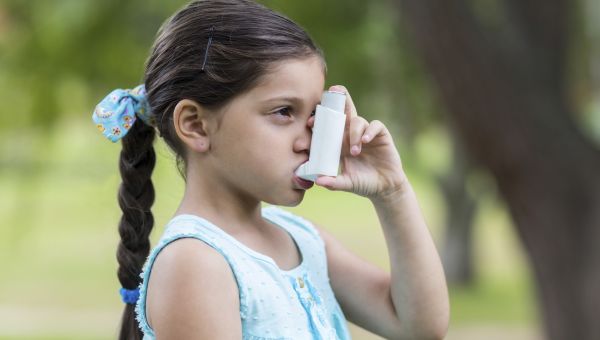One in three new cases of people who develop asthma under the age of 18 is due to the bad air quality in Belgium, according to new figures from the Independent health insurance funds.
The Independent Health Insurance Funds (the Onafhankelijk ziekenfonds and Partena) surveyed 441,696 of their members between the ages of 2 and 18, and found that the percentage of people taking asthma medication, meaning they are presumably suffering from asthma, is 12.9%. For comparison, the Belgian average, which also includes adults, is at 8%.
"This is very valuable information," said Guy Brusselle, a lung specialist at the UZ Gent hospital, who collected the data. However, not every child up to 6 years old taking medication necessarily has asthma. "During this period of the year, many children have RSV (the virus at the origin of a very common respiratory infection in infants), for which they will also receive asthma medication," he added.
"Only after the age of 6, children can cooperate with a lung function test enough to be diagnosed with certainty. However, a large number of young people in our country indeed have asthma, as we see in practice," Brusselle added.
The figures also show that one in three teenagers who took medication against asthma in 2018 did not use it in the previous five years, meaning they are new patients.
The American George Washinton University published a study based on measurements taken in 2015, which links the concentrations of nitrogen dioxide in the air to the number of new asthma patients under the age of 18, in 194 countries. According to the study, Belgium and the Netherlands are 'champions' in having new asthma patients due to nitrogen dioxide.
"20 to 30% of new asthma patients can be attributed to nitrogen dioxide," said Brusselle. "This confirms what we already knew: in addition to passive smoking, air pollution is the major risk factor for the development of asthma in children," he added.
Nitrogen dioxide is a substance that, together with fine dust and ozone, causes air pollution, as well as pollution in the smallest branches of our airways. Nitrogen oxides are mainly released when fossil fuels are burned, in agriculture and industry but also in traffic.
Flanders and the Netherlands are both densely populated and have a high volume of traffic, explaining the high numbers, according to Brusselle. "From a historical point of view, diesel cars have been favoured fiscally, for a long time. On the other hand, there are also our motorways, along which many people live," he said, adding that anyone living 50 to 100 metres from a busy road is at an increased risk of respiratory diseases.
"Strong reduction of nitrogen oxides and fine dust could prevent new cases," said Wies Kestens of the Independent Health Insurance Funds, reports Het Nieuwsblad. 4,000 fewer children a year would be affected if Belgium keeps its nitrogen emissions to a minimum, according to a calculation by the Barcelona Institute for Global Health.
Maïthé Chini
The Brussels Times

